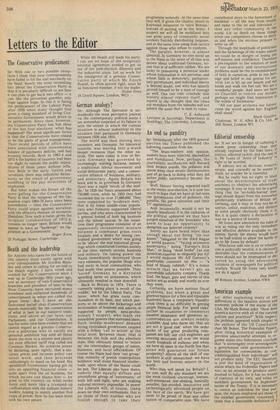German analogy?
Sir: Although The Spectator is undoubtedly the most perceptive journal vis the contemporary political scene I am somewhat surprised at its failure to note the extent to which the current situation is almost indentical to the situation that pertained in Germany between 1930 and 1933.
The world was then moving into recession, and Germany, for historical reasons, was moving into a much deeper recession than the other nations. The same today is true of Britain. Germany was governed by increasingly warring factions, namely a traditional labour movement and social democratic party, and a conservative alliance of business, military, and aristocracy. Again Britain has been, and is, so governed. In Germany there was a rapid 'revolt of the middle.' In 1928 the Nazis possessed about 750,000 votes, while by 1933 they had increased this to over 17,000,000. They were supported by 'moderate men,' that is by lower middle-class populatists who formerly supported liberal parties, and who were characterised by a general hatred of both big business and the labour unions. In the meantime their programme consisted of an apparently inconsistent mixture between a communal grass roots localism and a desire for strong centralised government which was going to be 'above' the real historical groupings which constituted German society at the time, namely unions, business and military. On taking power the Nazis immediately destroyed those very elements, the populist thugs who had roots in local communities, who had made that power possible. They 'saved' Germany by a Keynsian spending spree on armaments, which ultimately resulted in their downfall.
Back to Britain in 1974. There is currently taking place 'a revolt of the middle,' led by the Liberal Party. The latter, which has grass roots communalism at its base, and which purports to be above the bickerings and sectionalism of business and unions, is supported by people, semi-professionals I suspect, who loath the monolithic powers that surround them. Such 'middle moderates' demand strong centralised government coupled with a folksy 'call to action' at the local level. Between them, that is between the folk and the, absolute state, they obviously intend to 'mince up' the intermediary groups of union, business, and local officialdom. Of course the Nazis had their 'out group,' that minority of Jewish cosmopolitan bolshevic wall street financed intellectuals, upon whom all the blame could be put. The Liberals also have theirs, namely that equally diffuse and amorphous group of 'extremists,' of both left and right, who are making national recovery impossible. In power the Liberals will, of course, clamp down on their own enthusiasts, that is on those of their number who are foolish enough to take their programme seriously. At the same time they will, if given the chance, resort to Keynsian measures to 'save Britain.' Instead of putting us in the Army, I suspect we will all be mobilised into one great army of community social workers forcibly distributing largesse, and at the same time using mob tactics against those who refuse to conform.
The parallel, however, is almost identical. In Germany no-one stood up to the Nazis in the name of all that was decent about traditional Germany, noone that is of sufficient calibre. We are lucky in possessing a potential leader whose nationalism is not perverse, and whose faith in democracy, parliamentary government, and individual liberty is beyond doubt, and who has latterly proved himself to be a man of courage as well. One can only conclude that history almost repeats itself, and rejoice in the thought that the clean cut moralists from the suburbs will not inherit the mess that is sure to come.
C. E. Ashworth Lecturer in Sociology, Department oi Sociology, The University, Leicester.


































 Previous page
Previous page